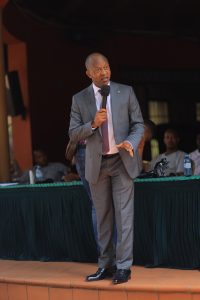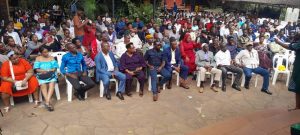Kampala 22nd Jan 2025
President Yoweri Kaguta Museveni has addressed the long-standing concerns of discrimination against Ugandans of Banyarwanda descent.
On January 21, 2025, the President issued an Executive Order aimed at ending systemic biases against the Banyarwanda community, particularly within the Immigration Department and the National Identification and Registration Authority (NIRA). The order, expected to be published soon, seeks to restore the rights and dignity of Ugandan Banyarwanda.
This landmark decision followed a meeting at State House, attended by members of the Council for Abavandimwe, led by Frank Gashumba. For decades, Ugandan Banyarwanda have faced discriminatory practices, including denial of passports, confiscation of national identity cards, and arbitrary removal from the NIRA database. The new Executive Order directs government agencies to cease such practices immediately and to treat Banyarwanda with the same respect and fairness accorded to other Ugandan tribes.

Frank Gashumba recently addressing a meeting of Banyarwanda at Speke Hotel
The Executive Order specifically mandates all confiscated passports and national identity cards must be returned to their rightful owners without delay. Also it directed Immigration officialsto halt any discriminatory practices against Banyarwanda and treat them on equal footing with other Ugandan tribes.
The issuance of this Executive Order comes after years of public outcry from Ugandans of Banyarwanda descent. Despite being constitutionally recognized as one of Uganda’s indigenous tribes under the 1995 Constitution, the Banyarwanda community has faced numerous hurdles in proving their citizenship. Unlike other tribes, they have often been subjected to unreasonable demands, such as providing evidence that their ancestors resided in Uganda before 1926—an almost impossible task for anyone.
Even with letters of verification from local councils (LC1 to LCV), Resident District Commissioners (RDCs), and District Internal Security Officers (DISOs), many Banyarwanda have been unfairly denied identity documents and instructed to “go to Rwanda,” despite having no ties to the country.
This systemic marginalization has had profound consequences. Without national identity cards or passports, many Banyarwanda have been unable to open bank accounts, register companies, apply for scholarships, transfer land and other properties, travel abroad for education, healthcare, or employment opportunities.
Thousands of Ugandan Banyarwanda have missed life-changing opportunities due to these barriers, which have now been squarely addressed by the President’s intervention.

Some of the Banyarwanda in a meeting at Speke Hotel in Kampala recently
The Council for Abavandimwe has been at the forefront of advocating for Banyarwanda rights over the past four years. Their efforts included petitioning Parliament, which debated the matter extensively. After meeting with the Council for Abavandimwe, President Museveni escalated the issue to Cabinet, resulting in the decision to issue the Executive Order.
Speaking to our reporter, Frank Gashumba, Chairperson of the Council for Abavandimwe, expressed his gratitude to the President for taking decisive action to restore the rights and dignity of Ugandan Banyarwanda.
“We thank President Museveni for standing with us and ensuring justice for the Banyarwanda community,” Gashumba said. He also urged Banyarwanda Ugandans to show their appreciation by voting for the President in the 2026 elections as a gesture of gratitude for his unwavering support.
The President’s intervention marks a pivotal moment in the fight against discrimination in Uganda. It not only upholds the constitutional rights of Banyarwanda but also sets a precedent for addressing similar concerns across other marginalized communities. As the Executive Order awaits full publication, it carries a clear message: equality and fairness must prevail for all Ugandans.







